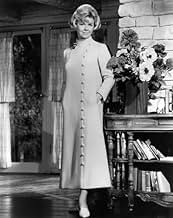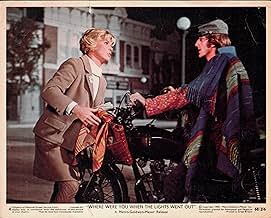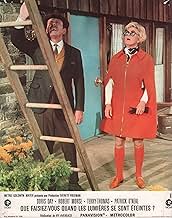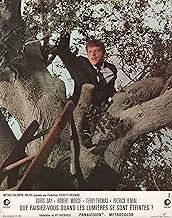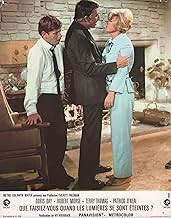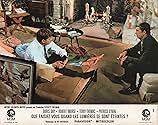Wo warst Du als das Licht ausging
Originaltitel: Where Were You When the Lights Went Out?
IMDb-BEWERTUNG
5,8/10
1003
IHRE BEWERTUNG
Füge eine Handlung in deiner Sprache hinzuDuring a blackout, a New York executive crosses paths with a Broadway actress and her husband.During a blackout, a New York executive crosses paths with a Broadway actress and her husband.During a blackout, a New York executive crosses paths with a Broadway actress and her husband.
- Regie
- Drehbuch
- Hauptbesetzung
- Auszeichnungen
- 1 Nominierung insgesamt
Murray Alper
- Passenger
- (Nicht genannt)
Hy Averback
- Newscaster
- (Nicht genannt)
Larry Barton
- Minor Role
- (Nicht genannt)
Empfohlene Bewertungen
Only the most ardent DORIS DAY fan could find this one even bearable to watch. When one thinks of the wealth of material available for a story about New York City's most famous blackout, a film that could have dealt with numerous real-life stories of what people had to cope with, this scrapes the bottom of the barrel for lack of story-telling originality.
Once again Doris is indignant because she suspects she may have been compromised on the night of the blackout when she returned to her Connecticut lodgings, took a sleeping potion and woke up in the morning with a man who had done the same, wandering into the house by mistake.
Nobody is able to salvage this mess--not Doris, not ROBERT MORSE, TERRY-THOMAS, PATRICK O'NEAL or LOLA ALBRIGHT. As directed by Hy Averback, it's the weakest vehicle Day found herself in, committed to do the film because of her husband's machinations and unable to get out of it. Too bad.
Once again Doris is indignant because she suspects she may have been compromised on the night of the blackout when she returned to her Connecticut lodgings, took a sleeping potion and woke up in the morning with a man who had done the same, wandering into the house by mistake.
Nobody is able to salvage this mess--not Doris, not ROBERT MORSE, TERRY-THOMAS, PATRICK O'NEAL or LOLA ALBRIGHT. As directed by Hy Averback, it's the weakest vehicle Day found herself in, committed to do the film because of her husband's machinations and unable to get out of it. Too bad.
Okay, 'Where Were You When the Lights Went Out?' is not as awful as the review summary implies but it is not a good representation of Doris Day's (nor the rest of the talented cast's) talents. Seriously the amount of talent here is enormous but sadly it is not used well.
Saw 'Where Were You When the Lights Went Out?' as somebody who loves Day and as part of my completest quest seeing the rest of her not yet seen. While there are a couple more to go, 'Where Were You When the Lights Went Out?' to me is definitely one of Day's worst films (apparently even Day herself thought so) in a career that did see some wonderful films and near-classics, 'Calamity Jane' and 'Pillow Talk' are my two favourites of hers. It is really a film only to be seen if like me you like Day and want to see all her films.
While she has given better performances Day is the best thing about the film, even though she spent most of its production in traction following a back injury (what the film is most notable for). There is the sense that she knew that the script was not good and that the film, writing and character she plays were beneath her (also think that she did this against her will, then again that's probably just me), but Day was always an effervescent and conscientious performer who always gave her all regardless of the quality of the material or the genre, and she does show charm and decent comic timing here.
The film is hardly cheap-looking, not lavish but there is a simple elegance. 'Where Were You When the Lights Went Out?' does boast a few very funny moments, though these moments are too far and between.
However, Hy Averback directs unimaginatively and, despite being talented performers, the supporting cast are not worthy of Day and struggle with very poorly written characters and an insipid script with a bad mix of overplaying and blandness. Patrick O'Neal is a vacuous and wooden leading man, sharing very little genuine chemistry with Day. Robert Morse goes through the motions and looks truly uninterested, on the other side of the spectrum Terry-Thomas tries to play it for laughs but this is one painfully hammy performance from him.
Despite a few moments, the script as said is insipid and borderline dumb. Nothing is hilarious here and hardly any of it is sophisticated or insightful. The story is horribly contrived and muddled and also suffers from a turgid pace and a staginess. The ending feels tacked on and doesn't feel right with the rest of the film.
Overall, a disappointment as a Doris Day vehicle and as an overall film. 4/10 Bethany Cox
Saw 'Where Were You When the Lights Went Out?' as somebody who loves Day and as part of my completest quest seeing the rest of her not yet seen. While there are a couple more to go, 'Where Were You When the Lights Went Out?' to me is definitely one of Day's worst films (apparently even Day herself thought so) in a career that did see some wonderful films and near-classics, 'Calamity Jane' and 'Pillow Talk' are my two favourites of hers. It is really a film only to be seen if like me you like Day and want to see all her films.
While she has given better performances Day is the best thing about the film, even though she spent most of its production in traction following a back injury (what the film is most notable for). There is the sense that she knew that the script was not good and that the film, writing and character she plays were beneath her (also think that she did this against her will, then again that's probably just me), but Day was always an effervescent and conscientious performer who always gave her all regardless of the quality of the material or the genre, and she does show charm and decent comic timing here.
The film is hardly cheap-looking, not lavish but there is a simple elegance. 'Where Were You When the Lights Went Out?' does boast a few very funny moments, though these moments are too far and between.
However, Hy Averback directs unimaginatively and, despite being talented performers, the supporting cast are not worthy of Day and struggle with very poorly written characters and an insipid script with a bad mix of overplaying and blandness. Patrick O'Neal is a vacuous and wooden leading man, sharing very little genuine chemistry with Day. Robert Morse goes through the motions and looks truly uninterested, on the other side of the spectrum Terry-Thomas tries to play it for laughs but this is one painfully hammy performance from him.
Despite a few moments, the script as said is insipid and borderline dumb. Nothing is hilarious here and hardly any of it is sophisticated or insightful. The story is horribly contrived and muddled and also suffers from a turgid pace and a staginess. The ending feels tacked on and doesn't feel right with the rest of the film.
Overall, a disappointment as a Doris Day vehicle and as an overall film. 4/10 Bethany Cox
Although Where Were You When The Lights Went Out is based on a French sex farce I doubt the original play was anything like this film. Especially since there is no French equivalent for Doris Day, no such thing as a virgin, an all French version on their big screen.
I well remember the 1965 blackout on the East Coast, just settling down to dinner with my parents and everything electric went out. But we didn't have half the adventures this cast had.
Doris plays herself essentially, an actress with an All American virgin image locked into a long running play with neurotic director Terry-Thomas at the helm and married to Patrick O'Neal an architect. When the blackout strikes there's no evening performance and Doris returns home to find O'Neal with magazine writer Lola Albright who had been doing a feature interview with them before she left for the theater.
In the meantime a jealous Robert Morse being passed over for promotion by his boss Robert Emhardt's idiot son steals two million in cash, something he had been planning for a while. The blackout puts a real crimp into his getaway plan.
All the principle players manage to wind up at Doris and Pat's Connecticut home and the bedroom comedy begins.
It wasn't the Code that put a damper on this film, it was rather Doris Day and the studio's attempt to remain true to the virginal image that her public expected. This was one of those films toward the end of her career that her husband Marty Melcher put her in to recoup monies he had made bad investments with, her money.
Where Were You When The Lights Went Out has not worn well over the years. Doris was carrying a heavy load here.
I well remember the 1965 blackout on the East Coast, just settling down to dinner with my parents and everything electric went out. But we didn't have half the adventures this cast had.
Doris plays herself essentially, an actress with an All American virgin image locked into a long running play with neurotic director Terry-Thomas at the helm and married to Patrick O'Neal an architect. When the blackout strikes there's no evening performance and Doris returns home to find O'Neal with magazine writer Lola Albright who had been doing a feature interview with them before she left for the theater.
In the meantime a jealous Robert Morse being passed over for promotion by his boss Robert Emhardt's idiot son steals two million in cash, something he had been planning for a while. The blackout puts a real crimp into his getaway plan.
All the principle players manage to wind up at Doris and Pat's Connecticut home and the bedroom comedy begins.
It wasn't the Code that put a damper on this film, it was rather Doris Day and the studio's attempt to remain true to the virginal image that her public expected. This was one of those films toward the end of her career that her husband Marty Melcher put her in to recoup monies he had made bad investments with, her money.
Where Were You When The Lights Went Out has not worn well over the years. Doris was carrying a heavy load here.
There was a time when you could send $25 to Doris Day's animal foundation, and she'd send you an autographed picture. Well, my dog was a cute shelter terrier that I named Griffin, and since this was one of my favorite films, I asked and she agreed to sign her picture "Where Were You and Griffin When the Lights Went Out?"
I like this movie. I even found the movie poster for this film at an antique shop in Myrtle Beach. It's rather cool with Ms. Day posing as if she is the Statue of Liberty.
I paid only $8 for it. It's the only thing I remember from that specific beach trip. I also own the video. I don't think the film can air right now due to legal stuff.
I have watched it a dozen times. It's a feel good movie. It has a lot of nice, fun people in it, even in the minor roles. This includes Steve Allen, Pat Paulson, Jim Backus, Ben Blue, Robert Emhardt and Morgan Freeman in an uncredited role.
About Doris Day.....she was gifted, versatile, and very underrated. Groucho Marx once said he knew Doris before she was a virgin. He was referring to her sunny, innocent girl next door image--which gets the one-two punch in this film, to great effect. Day plays a Broadway actress starring in the Constant Virgin, and most of the film discusses whether she sullied her marriage and herself by sleeping with Robert Morse during the NYC blackout from 1965.
This movie isn't Shakespeare. Just relax and enjoy the goings on. Turn back your mental clock to 1968. It's a well remembered time when people drove big Chrysler convertibles. Plus, Lola Albright wears a dark wig and seduces Patrick O Neal with the line "I like big buildings." The Letterman sing the catchy title tune, I wish they would have put it on their LPs from that period. Terry-Thomas and Robert Morse comment on the space between their teeth. Discussing failed dental work between these two actors was entirely unexpected.
Some of the reviews in this group suggest the movie is terrible and Day's star was in decline. They are not being fair. I believe people stay away from terrible movies and terrible movies lose money. This movie was actually a big earner in 1968. Yes, It's true that this is Day's next to last film before she went to TV. However, her last film "With Six You Get Eggroll" was released later in the same year AND was more profitable than this one.
In defense of Ms. Day's star power, the business did not leave Day. She left the business. All good things eventually end. The world is now less bright without Day.
I like this movie. I even found the movie poster for this film at an antique shop in Myrtle Beach. It's rather cool with Ms. Day posing as if she is the Statue of Liberty.
I paid only $8 for it. It's the only thing I remember from that specific beach trip. I also own the video. I don't think the film can air right now due to legal stuff.
I have watched it a dozen times. It's a feel good movie. It has a lot of nice, fun people in it, even in the minor roles. This includes Steve Allen, Pat Paulson, Jim Backus, Ben Blue, Robert Emhardt and Morgan Freeman in an uncredited role.
About Doris Day.....she was gifted, versatile, and very underrated. Groucho Marx once said he knew Doris before she was a virgin. He was referring to her sunny, innocent girl next door image--which gets the one-two punch in this film, to great effect. Day plays a Broadway actress starring in the Constant Virgin, and most of the film discusses whether she sullied her marriage and herself by sleeping with Robert Morse during the NYC blackout from 1965.
This movie isn't Shakespeare. Just relax and enjoy the goings on. Turn back your mental clock to 1968. It's a well remembered time when people drove big Chrysler convertibles. Plus, Lola Albright wears a dark wig and seduces Patrick O Neal with the line "I like big buildings." The Letterman sing the catchy title tune, I wish they would have put it on their LPs from that period. Terry-Thomas and Robert Morse comment on the space between their teeth. Discussing failed dental work between these two actors was entirely unexpected.
Some of the reviews in this group suggest the movie is terrible and Day's star was in decline. They are not being fair. I believe people stay away from terrible movies and terrible movies lose money. This movie was actually a big earner in 1968. Yes, It's true that this is Day's next to last film before she went to TV. However, her last film "With Six You Get Eggroll" was released later in the same year AND was more profitable than this one.
In defense of Ms. Day's star power, the business did not leave Day. She left the business. All good things eventually end. The world is now less bright without Day.
Stagy adaptation of Claude Magnier's 1956 French play of the same name incorporates the New York City blackout of 1965 into a stagnant roundelay involving an actress, her husband, an agent plus a young embezzler. Dim comedy doesn't even utilize the central calamity for pointed jokes about life in the Big Apple, instead becoming a strained sitcom plunked down in suburbia. Doris Day never lets a bad script get the best of her; even under the most trying of circumstances, the star gives 100% and usually comes out unscathed. Spoofing her own goody-two-shoes image, Doris gets some laughs later in the picture when she's meant to be (comically) sedated; however, Day's male co-stars (Patrick O'Neal, Robert Morse and Terry-Thomas) are not well-suited to her, and neither is the shapeless hairdo she's sporting. For her part, Doris was quick to dismiss the film as "an alleged comedy", noting it was one of several pictures her husband-manager signed her to without her consent. *1/2 from ****
Wusstest du schon
- WissenswertesThere appears to be a rights issue tied up with the issuing of this film. While it was a television staple for many years and was released on videocassette several decades ago, it has not been televised or released in digital format since that time. As of 2018, the film has been out of circulation for nearly 25 years.
- PatzerWhen Margaret is sitting on the couch during her interview, the yellow cushions beside her keep moving.
- Zitate
Margaret Garrison: [repeated line]
Margaret Garrison: Hello, Peter, so you're here!
- VerbindungenFeatured in Lionpower from MGM (1967)
- SoundtracksWhere Were You When The Lights Went Out?
Words by Kelly Gordon
Music by Dave Grusin
Performed by The Lettermen
[Title song played over the opening titles and credits, with a reprise played over the end credits]
Top-Auswahl
Melde dich zum Bewerten an und greife auf die Watchlist für personalisierte Empfehlungen zu.
- How long is Where Were You When the Lights Went Out??Powered by Alexa
Details
- Erscheinungsdatum
- Herkunftsland
- Sprachen
- Auch bekannt als
- Where Were You When the Lights Went Out?
- Drehorte
- Produktionsfirma
- Weitere beteiligte Unternehmen bei IMDbPro anzeigen
Box Office
- Bruttoertrag in den USA und Kanada
- 7.988.000 $
- Laufzeit
- 1 Std. 29 Min.(89 min)
- Sound-Mix
- Seitenverhältnis
- 2.35 : 1
Zu dieser Seite beitragen
Bearbeitung vorschlagen oder fehlenden Inhalt hinzufügen

